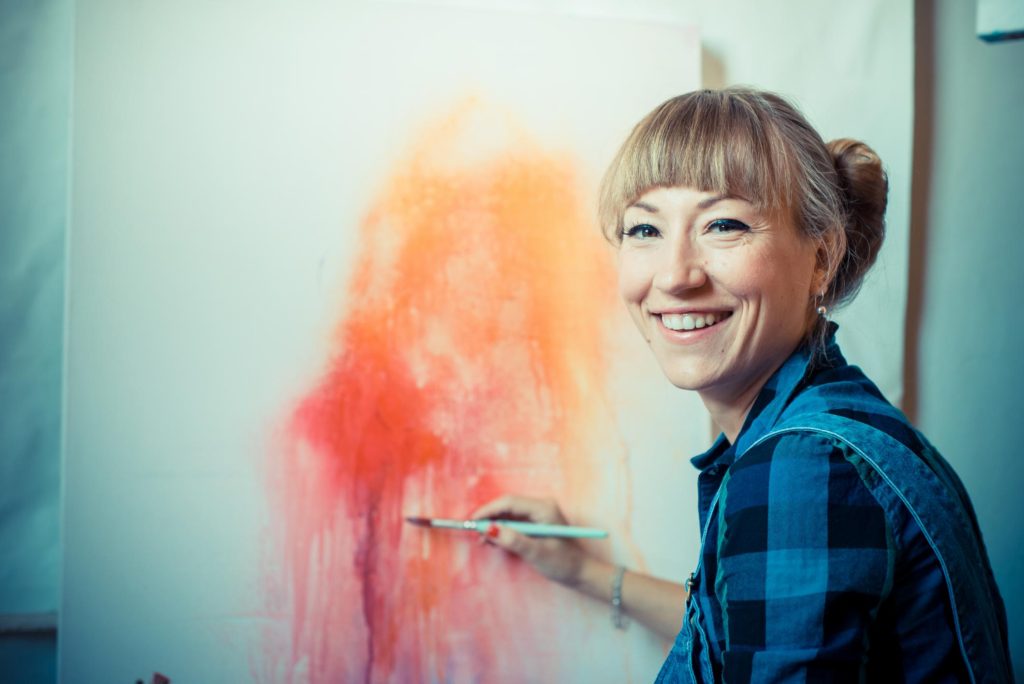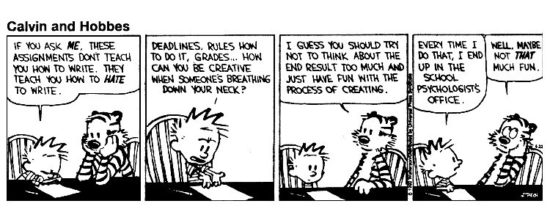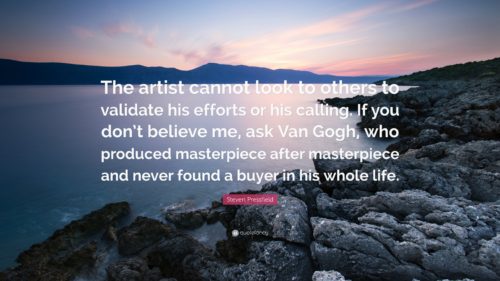
Expressing our creativity can make us feel vulnerable. We’re concerned about how our work will be received by others. But expressing our creativity is an essential need – it feeds our spirit and allows us to realize our gifts. Find out why creativity requires courage and how you can overcome creative blocks that get in the way. (Estimated reading time: 5 minutes)
“Creativity requires the courage to let go of certainties.”
— Erich Fromm
Go back to those times in your nursery school days when you were given blank sheets of paper and a case full of colorful crayons.
If you were anything like me, you excitedly grabbed each crayon and scribbled and doodled to your heart’s delight. After creating your ‘masterpiece’, you rushed back home to share your magnificent work of art with your folks, who showered you with praise (hopefully).
No matter how amateurish your drawings looked, you took pride in them and never questioned their beauty. Yet as you grew older, you became more sensitive about your creations and feared how others would judge you.
Legendary artist, Pablo Picasso, identified this issue when he said, “Every child is an artist. The problem is how to remain an artist once we grow up.”
As a writer, I’m all too familiar with the vulnerability comes from expressing ourselves, be it in the field of music, performing, writing, or even in business.
Every time I post a new blog piece, write an article, or publish a podcast, it feels scary. But I’ve learned to make fear my ally and stick with it. Deep down I know that creativity requires courage.

The truth is that creative expression is not for the faint of heart. It takes courage to express our individuality and present it for the world to see, especially in the age of social media where you receive instant feedback.
While you could gain some fans along the way, there’s also a chance you’d attract critics, haters, and people who don’t care much for what you do.
But behind every successful idea that emerged from a creative impulse is a determined individual who backed it up till the very end and did not succumb to their fears.
They dared to create, follow their passion and go against the status quo, even in the midst of challenges and skepticism from others.
In her book on creative living, Amanda Palmer writes, “When you’re an artist, nobody ever tells you or hits you with the magic wand of legitimacy. You have to hit your own head with your own handmade wand.”

What most people don’t understand is that creativity is a numbers game and you have to be willing to produce dreadful work and face rejection before you can finally reach a level of competence that makes you stand out amongst your competitors.
Even artistic geniuses such as Van Gogh and Michael Jackson produced numerous paintings and songs of mediocre quality before reaching their level of perfection.
In the initial stages, 95% of what you make will be ‘bad’ and 5% will be great. But as you practice and get better, you’ll find a shift in the percentage of ‘great work’ – it may jump to 10% or even 30%. They key is to focus on building that 10-30% instead of beating yourself up for the 70-90% of your not-so-great work.
It’s also precisely during this period of producing ‘crappy work’ while you hone your skills and overcome any negative thinking around your abilities and identity as an artist.
Creativity is a need of the spirit and it’s imperative for us to overcome our creative blocks so that we can express ourselves fully and authentically.
Here are four ways by which you can achieve this:
1. Manage your inner critic: Your inner critic represents the negative aspect of your internal dialogue that tells you that you aren’t good enough, and constantly magnifies your flaws. This voice originates from the limiting beliefs that you’ve developed about yourself over the years, especially in your youth. If you plan to traverse the emotional minefield of creative living, you have to learn how to manage your inner critic.
2. Be open to constructive feedback: When your inner critic is in check, you’ll be in a stronger position to hear what others have to say about your work. When you avoid viewing your work as an extension of you, you’re less likely to perceive any feedback or rejection as a personal onslaught. You also want to be selective about whose feedback you take seriously by establishing some criteria. I like to get the opinions of those who have some street cred in my area of interest and who my best interest at heart.
3. Let love and inspiration be your guide: Creating from a place of love and inspiration is totally different to when you create from a space of ego and fear. When love and curiosity lead the way, it gives us a panoramic vision of what we’re capable of doing and it cracks open the possibilities within our existence. I’ve noticed that the common thread amongst all successful artists is their sheer passion for their art. They love it so much that they’d even do it, even if they weren’t getting paid for it.
4. Focus on adding value: Although creating for our own enjoyment and personal evolution is a good enough reason to dabble in it, what would make it even more powerful is if we use our creations to improve the lives of others. Author Brené Brown said, “The only unique contribution that we will ever make in this world will be born from our creativity. If we want to make meaning, we need to make art.”
Making a contribution to society through our creative talents can add value in many ways, such as enhancing beauty (fashion and interior designers), entertaining others (musicians and actors), getting people to think differently about life, or temporarily escape it (writers).
Creative living is like a treasure hunt to uncover the jewels that the Universe has planted deep within us all. It’s the hunt for these jewels that can transform a mundane existence into a magical one.
All my best on your journey,
Seline

Question for you: Do you believe that creativity requires courage? Do your fears tend to get in the way of your creative expression?
Did you like this post? Sign up below and I’ll send you more awesome posts like this every week.

You’re so right. creating things is a big risk and feels very scary sometimes- far too often people are afraid to take those risks and area afraid to take a leap of faith.
I know that I may fail yes but the chance for glory and something better is enough to drive me to keep trying and to keep creating and doing what I love.
Steph
Stephanie- yes the change for personal growth and glory is totally worth it! Glad you reached that conclusion. 🙂